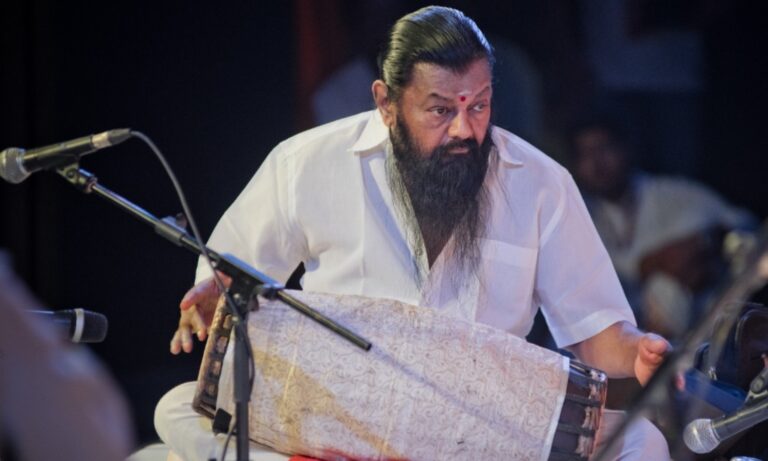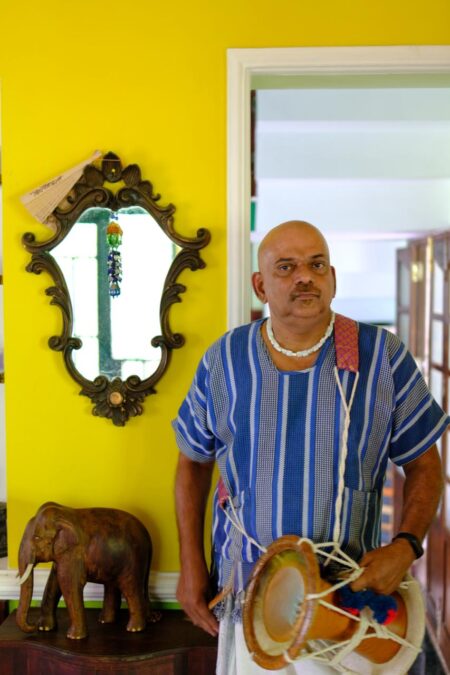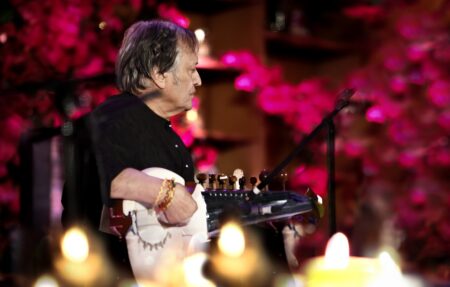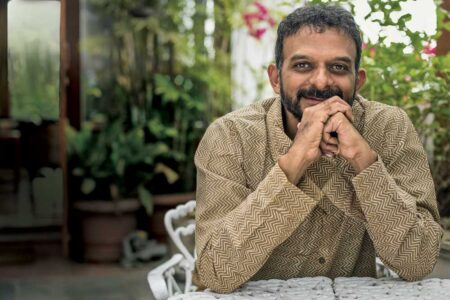Legendary mridangam maestro Karaikudi R Mani was known for his unique style of playing and technical brilliance.
Karaikudi R Mani, a distinguished and influential exponent of the Mridangam in the Carnatic world, passed away on May 4th (today) in Chennai at the age of 77. Born on September 11, 1945, in Karaikudi, Tamil Nadu, Mani leaves behind a legacy that is unparalleled in the world of Carnatic music.
Mani’s unique style of playing and technical brilliance were truly exceptional. He had an innate ability to evoke emotions through his performances, and his rhythmic patterns were unmatched. At the tender age of three, Mani began his journey in Carnatic music, and he soon became engrossed in learning the Mridangam. He received training from several gurus, including Karaikudi Ranga Iyengar and Harihara Sharma (father of Vikku Vinayakaram). Harihara Sharma guided Mani to his cousin K M Vaidyanathan, a ghatam artist, for advanced lessons. This tutelage led to an explosion in his fingering techniques, composing and clarity of thought.
His idol, Palghat Mani Iyer, was in his prime during the early years of Mani’s career. Despite this, Mani began performing regularly and quickly established himself as a force to be reckoned with. His incredible rhythm patterns were a blend of intuition and ingenuity, making him a sought-after accompanist and solo artist.
Thani Avarthanam concerts
Mani’s contributions to the world of Carnatic music go beyond his technical proficiency. He is credited with the invention of the “Thani Avarthanam” concert, which has become popular in Carnatic percussion. Before his concept, it was almost acceptable for rasikas to get up and go for a leisurely stroll when the thani avarthanam — the rhythm section of a Carnatic concert — began. In 1993, Karaikudi Mani presented his first Thani Avarthanam concert along with the late Kanjira master G Harishankar. This spellbinding performance is regarded as a landmark moment in the classical percussion field. It has revolutionised the role of the Mridangam, proving that as an art form, South Indian percussion instruments can be played as solo instruments in their own right.
Mani’s pioneering concept has been taken up by several leading Mridangists who have also performed Thani Avarthanam concerts. Since then, Mani has conducted several Thani Avarthanam duet concerts featuring leading percussionists on Ghatam, Thavil, Chendai. His contributions to the world of Carnatic music will be remembered for generations to come.
Karaikudi Mani bani
Mani was known for his unique style of playing, later known as the Karaikudi Mani style (Bani), which was acclaimed and attractive, and adopted by artists and students belonging to other schools. He had over 1200 disciples all over the world.
Mani founded the Sruthi Laya ensemble in 1986, which combined melody and percussion with the main aim of creating awareness for percussion among the audience. The ensemble’s exclusive repertoire was a testament to Mani’s dedication to the art. In 1990, Mani joined with VS Narasimhan on Melodyssey, a project with 40 artists that won widespread appreciation and was released on tape. Mani foryaed into the collaborative space with the Australian Art Orchestra, resulting in a long-term link between jazz and Carnatic music, which produced an album titled ‘Into the Fire,’ followed by ‘Two Oceans’ that had an extensive world tour. He also collaborated with several international artists, including Paul Grabowsky, Eero Haemmeneimi, Elio Marchesini, Livio Magnini, and Paul Simon. Additionally, he founded the Sruthi Laya Seva School, which has centers in Chennai, Bangalore, Australia, London, the USA, and Canada.
Mani believed in helping audiences educate themselves. For that, he played only in one nadai for a whole year, and soon audiences could recognize them. Mani’s rhythm language was not about loud sounds and thrilling strokes, but about conveying the intricacies of laya through subtle expressions. He transformed the style of mridangam playing and made the tani avarthanam a much-looked-forward-to section of a kutcheri, following in the footsteps of his idol, Palghat Mani Iyer.
Mani’s passing is a great loss to the world of Carnatic music. His legacy will live on through his disciples and those who have been touched by his music.





3 Comments
I want to visit this website once.
That was one beautiful article on Guru Karaikudi Mani by Ms Radhika, sketching his entire life with perfect accents on his milestone contributions!
As someone who had been sharing tours and stages of many genres with him for nearly four decades, I could also observe, take on and analyze his emotions, both musical and otherwise throughout my association. I was one of the rare privileged ones to suggest and comment without reservations.
His honesty towards audience, Focus on the work and urge for innovation have made a lasting impression in my perception and attitude on music from a very early age. He believed that musical rhythm is to elevate the soul and that is certainly possible with a good quality entertainment devoid of meanness.
Fantastic article by Radhika
A tribute to the legend Guru Karaikudi Mani Sir